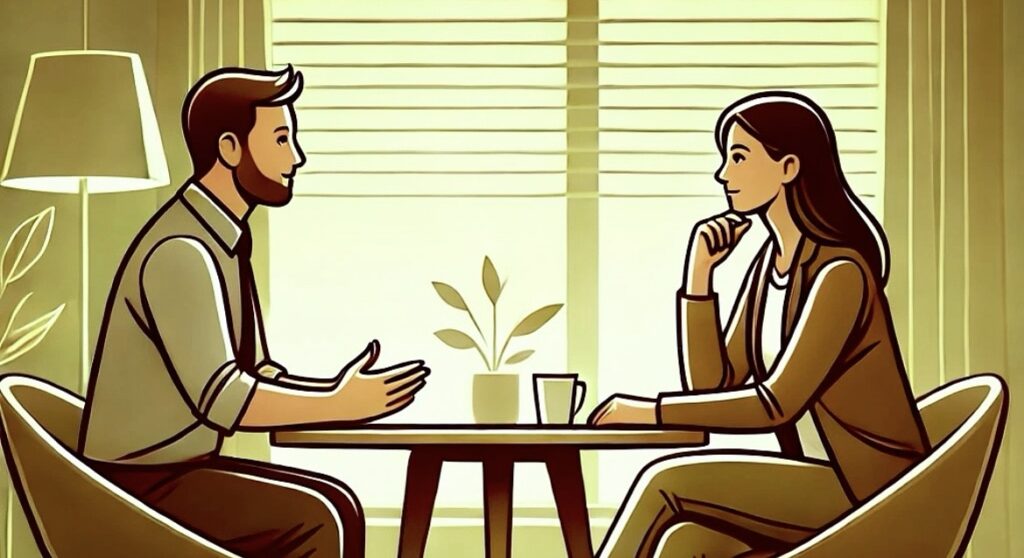Listening – true, deep listening – is a superpower. We live in a world where the pressure to broadcast content, to have our say, and to make our mark is constant. I realise that in writing this I am doing all the above, but this article is about a lifetime of listening. It is a reminder of the quiet and essential power of listening.
I come from a large family – a large family with Irish and Scouse heritage. That comes with a lot of talking. But we can’t all be talkers; some of us are listeners. My school reports always remarked on how quiet I was, and I always felt it was a criticism. But I was listening, and listening is essential to communication and understanding. It might be part of my nature, but I’ve also developed this skill throughout my life. I’ve practiced it in my job, through volunteering, in my hobbies, and in my personal relationships.

Active listening
I first learned about active listening while training as a volunteer for Samaritans. This charity helps people facing mental or emotional challenges. The nature of the phone calls to Samaritans meant that this was high stakes listening at times. I learned to override the human instincts to give advice, to make assumptions on anything, and to relate issues to my own experience. Listening for Samaritans is all about giving the callers space to talk and be heard. It is about metaphorically meeting them where they are at the time of the call. Learning how to listen for Samaritans made me very aware of how rare true listening is in life.
Listen first, teach second
I have taught a range of courses in English language and linguistics over eighteen years as a teacher. Many people think of teachers as broadcasters of information, and there is plenty of that. But my philosophy of teaching is based on listening as much as possible. This is because every learner is different, and every class is collectively different. People come to the classroom with different prior knowledge, experience, needs, and learning styles, not to mention rapidly evolving technological tools at their fingertips. I believe that a good teacher should listen as much as they transmit in order to find out what their learners know and what they need. This way, the teacher also learns from the class. Not only is it impossible to teach well if you don’t listen to your learners; it is impossible to learn and develop as a teacher if you don’t listen.
As a linguistics researcher, I specialise in discourse analysis. This is the fine-grained study of real-life language in use – people speaking and writing. Understanding how and why people use the words they use is an intense form of listening. I don’t try to guess at the inner workings of a person’s mind from their language choices. But I know how their choices influence listeners and shape meaning.
Listen with your body
I dance salsa. While all dancing involves listening to the music, social dancing requires a person to listen to the music and to their partner. As dancers, we listen to the music in the traditional sense, with our ears, but we also listen to our partner in a broader, physical sense which allows us to be open to signals and to respond. For example, I need to listen to how my partner leads or follows for the dance to work. I need to understand how my partner is interpreting the music we’re both listening to so that we can enjoy a fun, connected, and creative dance. Social dancing doesn’t work if one person isn’t listening and if they make assumptions about what their partner is “telling” them.
Working with clients
I believe that my listening ability is what drew me to copywriting. Working for a client requires excellent listening skills. I need to know what they are trying to communicate to the world, and then I need to articulate it. Every word matters; every word they say and every word I write. To get this right, I need to listen deeply and actively to what my clients say in the brief and in conversation. I need to absorb the message they want to convey and, essentially, the voice they want to convey it in. I need an open mind and open ears.
How to listen
My advice for true listening in professional, social, and personal relationships is:
- Listen to what people are really saying, not what you think they are saying
- Don’t fill in the gaps; ask questions
- Don’t jump in with your own experience and opinions. You are listening to someone else, not playing snap
- Never talk across someone
- Use questions to draw people out, but more importantly, listen to their answers, especially when they say more than they need to or do not answer the question at all
- Listen for what people do not say
- Try to meet people where they are or navigate to a place where you can share a moment of understanding. This is not the same as agreeing
- In a world where everyone is broadcasting, don’t forget to listen
